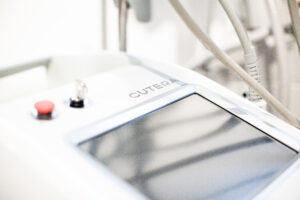Skin laser treatment typically requires indepth knowledge, experience or training. Usually performed by trained professionals like dermatologists, surgeons or vascular nurses. Laser treatment may seem straightforward but advanced technology is used and there are potential risks if it’s not all done correctly.
Professionals will first assess the patient’s skin type, medical history and any specific concerns to determine whether skin laser treatment is safe for the person and to ensure the treatment will be effective.
Using laser machines requires expertise and training. Different lasers are designed for specific skin issues and professional laser technicians need to select the right parameters, such as wavelength and energy levels, for each patient, depending on the assessment above. Laser machines are not all the same and some require more treatments to get the same results. Laser Aesthetics uses top-of-the-line Cutera machines from the US.

What can go wrong with skin laser treatment?
Laser treatments can pose risks, including burns and scarring. Inconsistent or incorrect application of lasers can cause changes in skin pigmentation. This may be darkening (hyperpigmentation) or lightening (hypopigmentation) of the skin. Infection and eye damage are other risks to be aware of with untrained or inexperienced laser technicians.
Lack of proper hygiene and aseptic techniques during the laser procedure can introduce bacteria, leading to infections. This risk is especially high if the equipment is not sterilised. Because laser devices emit intense light that can cause eye damage, it is essential that both the technician and patient wear proper eye protection.
Lack of knowledge and experience by the technician may result in inadequate management of side effects, such as swelling, redness or itching.
Make sure there is a post-treatment follow up
The offer of post-treatment follow up care and advice is also something to be mindful of. Advice includes wearing sun protection and avoiding certain skincare products. Follow-up care means having someone to contact if you have concerns.
Laser technicians also need a good understanding of skin anatomy to target specific issues without causing harm. This includes knowing the depth at which various skin structures are located. They must be able to adapt the treatment to the individual patient’s needs and respond quickly to any unexpected reactions. They also need to be confident to advise a patient against treatment if their skin is not suitable.
Laser treatments can be highly effective for skin concerns. It’s important to do research and ensure the technician you choose can administer the treatment safely. Always consult with a trained and experienced practitioner who can assess your individual needs and provide appropriate recommendations. Always choose reputable clinics or practitioners who prioritise client safety.
Related Posts
It’s simple: good reasons why we recommend a skin consultation
Our skin consultation is $60 – you get that back if you book a treatment within 3 weeks. Money well spent to get the…
What are the best skin-tightening options without surgery?
Six skin-tightening options without surgery to think about: from laser treatment, to skincare and dermaplaning...
Is eating your way to good skin the answer?
A recent study shows that mangoes may help reduce wrinkles over time, as long as you don't eat too many.